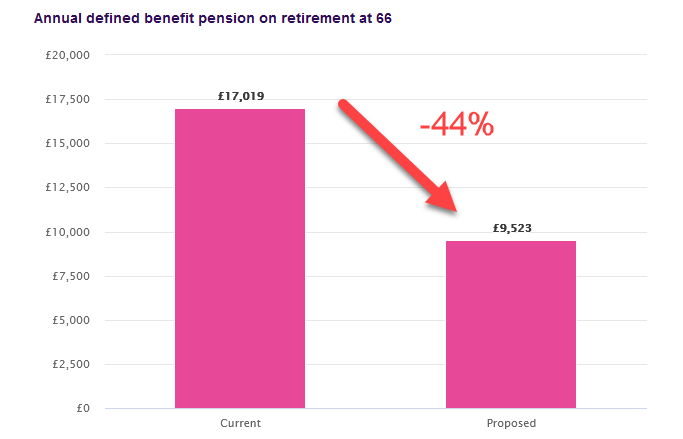A brief update on the USS pension dispute and upcoming ballot for industrial action.
Despite intensive efforts by UCU’s negotiators to find alternative solutions, employers have decided to force through their plans for severe cuts to your retirement benefits through the USS Joint Negotiating Committee (JNC).
These are cuts of epic and unprecedented proportions.
Employers have simply decided that, in order to avoid having to pay higher contributions or commit to providing stronger levels of covenant support to the scheme, they would rather betray us and make us poorer in retirement. Not a little bit poorer: the average USS member stands to lose 35% of their take-home retirement income (a loss of as much as £7,000 a year).

Why is this happening – and why is this happening now?
Every three years, pension funds are expected to undertake a valuation of the viability of their schemes. In March 2020, the USS trustees ploughed ahead with a scheme valuation using market data from the peak of market turmoil in the first wave of the Covid pandemic. Unsurprisingly, this wiped billions off the value of the scheme’s assets (note: assets have since entirely recovered and using the most recent USS estimate, stand at a record £87.8bn). Not content with using Covid-affected data, measured at the worst possible time, USS reworked their fully discredited Test 1 and ramped up prudence much further than in previous valuations, forecasting no real term asset growth in the next five decades (see graph below), when USS assets have more than quadrupled in the last thirty years and current assets already vastly exceed the forecast. Predictably, this valuation approach – which was entirely debunked by the Joint Expert Panel established after the 2018 USS strikes – produced an entirely artificial ‘deficit’, which USS trustees proposed to meet by hiking contributions somewhere between 42% and 57% of salary (against 26% before the 2018 dispute).
This graph shows the actual value of USS investments over time (adjusted for inflation), and the predictions for future asset growth that were built into each valuation. Note how USS repeatedly underestimates the performance of the assets. But the latest valuation makes even more implausible negative assumptions. It assumes the assets, valued in 2020 at around £67bn, will effectively 'flatline' for the next two decades. Yet in the year since the assets have grown to nearly £80bn!

USS real-terms asset growth and forecasts - 1995-2068
© Sam Marsh and Jackie Grant on Twitter
What UUK proposals – as approved by the JNC – entail
The changes to the scheme pushed through by our employers are far-reaching and unprecedented in scale. They revolve around three key reforms to the current benefit structure:
- The threshold between defined benefit (DB) and defined contribution (DC) will be lowered from £60,000 to £40,000. A much lower threshold means that a much greater proportion of our contributions will go to the DC component of the scheme. This is significant for a range of reasons, not least because DC offers no guaranteed income in retirement and because employer contributions on salary above the threshold are significantly lower (12% against 21.1% below the threshold).
- The accrual rate – the fraction of your pensionable pay that will be paid to you in retirement – will be slashed from 1/75th to 1/85th. This means that you will earn 12% less annual retirement income from each year you work (note: the cuts to our pensions are much deeper than 12%, for reasons we outline below).
- Indexation will be capped at 2.5%. Under the current regime, pensions are inflation-proofed. Benefits are indexed on inflation, i.e. they increase automatically in proportion to Consumer Price Index (CPI) up to 5%, and half of CPI between 5% and 15%. UUK proposals introduce a hard cap at 2.5%. This means that our pensions will no longer be protected for inflation beyond the cap. The latest inflation forecast by the National Institute of Economic and Social Research is 3.9% for 2022. Under the new regime, the value of our pensions would therefore decrease in real terms by 1.4% in just one year. The proposed cap means automatic year-on-year real term pension cuts.
What does this mean for my pension?
The employers’ package of cuts means that the average USS member will suffer a 35% loss to their take-home retirement income. And that’s not all: a significant proportion of our retirement income will now come from the DC component of the scheme, which provides no guaranteed benefit and where the value of our pension depends on investment performance. UCU has developed a modelling tool so members can see what these proposed changes will mean for their retirement benefits. We encourage you to use the tool (it takes less than a minute) and see for yourself how much your employer values you. You can access the modeller here.
Under the proposed changes, employers are the only party that will suffer no detriment and will in fact see their contributions decrease as a result of the much lower rate applicable above the salary threshold.
Pension cuts are attacks on the young
When changes are made to a pension scheme, they apply to all pensions built up from a certain point in time. If these cuts are implemented, this means from April 2022.
The younger you are, the more your pension will be cut.
A 55 year old staff member might have a reduced pension for 10 years. They keep what they built up until April 2022. But a 21 year old graduate joining the workforce for the first time next summer will have a reduced pension for their entire working life.
What happens next
All evidence suggests that our employers were never interested in challenging the USS valuation and that their intention is now to implement these regressive changes as soon as humanly possible. Although UUK claimed that the proposals would now go out to a 60-day member consultation, it has now been revealed that USS trustees have already accepted the UUK proposals and will implement them without delay. If nothing changes, our contributions will increase by 0.2% next month and the full package of reforms will come into effect from April 2022.
Employers have failed to support alternative compromise proposals put forward by UCU and have reneged on their past promise to honour the findings of the Joint Expert Panel, which recommended substantial changes to the valuation methodology used to assess the financial health of the scheme.
The only realistic way to avoid this catastrophic outcome is to start preparing for industrial action, which now appears inevitable.
Ballots
Ballot packs will be dispatched to members preferred address by first class post on Monday 18 October.
Please take a moment to confirm that your details are correct on My UCU, and ideally choose your home address as your preferred option.
 Close
Close


